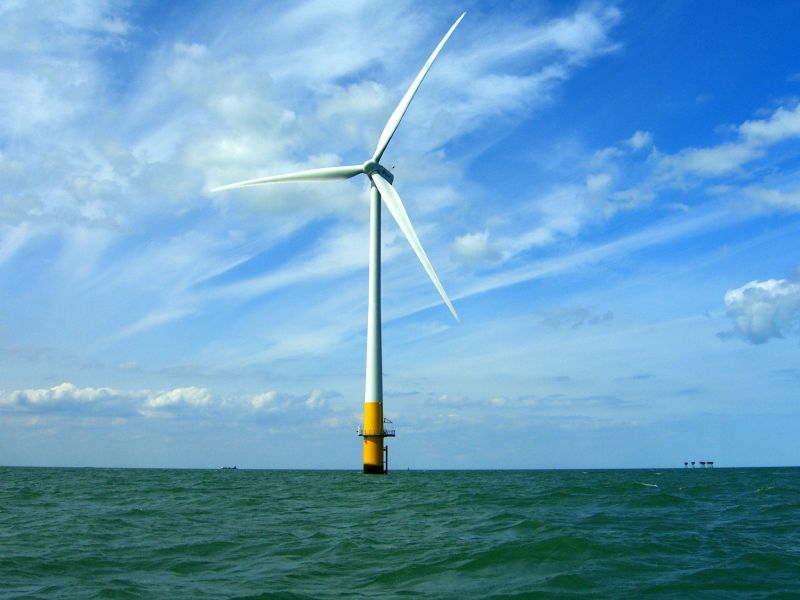Bluewater Wind terminated its contract with Delmarva Power Dec. 27, officially ending the nation's first power purchase agreement for wind power.
"We've continued to hold discussions with several potential buyers and investors but haven't yet concluded a deal," said David Gaier, spokesman for NRG Energy Inc., the parent company of Bluewater Wind. "As a result … we notified Delmarva Power & Light that we're terminating the 200 MW power purchase agreement, effective at year end."
Problems with the contract arose in 2010 when Bluewater missed its first deadline to move forward with the wind farm project. Bluewater forfeited $2 million to Delmarva Power at the time, but continued to move forward with plans for a wind farm off the Rehoboth Beach coast.
NRG Energy announced Dec. 12 that it was putting all of its offshore wind projects on hold. The firm actively sought a company to acquire Bluewater and its power purchase agreement with Delmarva. At stake was $4 million that Bluewater would lose if it did not continue with the wind project after a Dec. 27 deadline.
Delmarva Power officials accepted the termination and said they would continue to support the state's long-term renewable energy goals.
"Delmarva Power and NRG worked hard to see this project to fruition," wrote Gary Stockbridge, region president for Delmarva Power, in a press release. "But the inability to secure a financing partner prevents us from moving forward."
Stockbridge said the $2 million security Bluewater forfeited will be credited to Delmarva Power customers.
As for meeting the state's renewable energy requirements, Stockbridge said Delmarva Power has added land-based wind projects, solar energy projects and a fuel-cell project to its portfolio.
"We have a very diverse and balanced clean energy portfolio in place and are confident that we will continue to be able to meet the goals that have been set of 25 percent by the year 2025."
Gaier said NRG will continue to seek a buyer or major investor for the project. NRG also continues to pursue a lease from the Bureau of Ocean Energy Management to install wind turbines offshore.
Future remains bright
Wind advocate Chad Tolman, a former DuPont chemist and university professor, has worked to bring offshore wind power to Delaware since 2008.
Despite the recent setback, he believes that wind power will become a reality someday.
"I think the future is bright but it's just going to be slower than I thought it might be," Tolman said. "It may take 10 years."
The benefit of offshore wind power along the Mid-Atlantic coast is huge, he said. There are dense populations along the coast that would be easily reachable by transmission lines connected to an offshore grid, Tolman said.
Already, Mid-Atlantic states north of Delaware have received approval for offshore wind projects. Cape Wind recently was the first offshore wind farm in the U.S. to secure federal approval and obtain a lease for ocean space from BOEM, despite an organized effort by Robert Kennedy Jr. and a couple of Native American groups against it. The Massachusetts Supreme Court ruled Dec. 28 that a power purchase agreement between Cape Wind and National Grid is valid.
Construction of the 130-turbine farm off the Cape Cod, Mass. shoreline is expected to take two years once it begins, according the Cape Wind website.
Closer by in neighboring New Jersey, plans for six offshore wind turbines in Atlantic City are moving forward. The turbines will be erected in state waters and produce 25 megawatts of energy annually, according to the Fisherman's Energy website, owners of the proposed wind farm. Construction is expected to begin in early 2012 and be completed by fall.
These projects could act as a catalyst for a Mid-Atlantic offshore wind power grid.
The creation of such a grid was discussed a couple of years ago during a wind conference Tolman attended. At the time, Tolman said, Google representatives expressed interest in laying a multibillion-dollar cable line alongside power lines connecting Mid-Atlantic offshore wind farms.
"There's no question that it is going to develop, but right now the investment climate is hostile," Tolman said.
The economic downturn resulting in less power consumption, a decrease in natural gas prices and the loss of federal loan guarantees that would protect a bank's investment in a costly offshore wind farm all led to a bleak prospect for wind production off the Delaware coast, and the resulting cancellation of the Bluewater Wind contract.
Melissa Steele is a staff writer covering the state Legislature, government and police. Her newspaper career spans more than 30 years and includes working for the Delaware State News, Burlington County Times, The News Journal, Dover Post and Milford Beacon before coming to the Cape Gazette in 2012. Her work has received numerous awards, most notably a Pulitzer Prize-adjudicated investigative piece, and a runner-up for the MDDC James S. Keat Freedom of Information Award.
















































